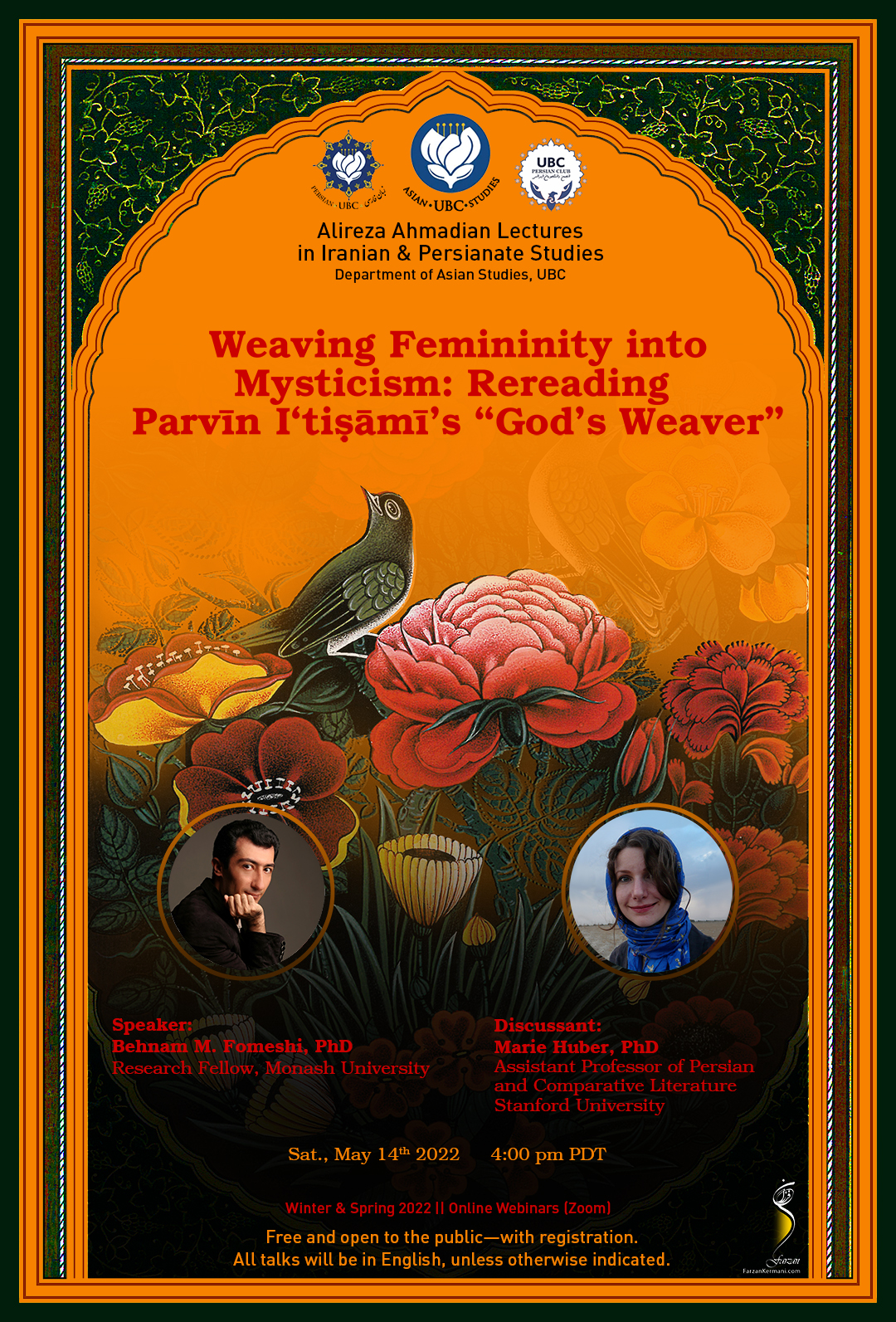

Poster design by Farzan Kermani
در هم بافتنِ زنانگی و عرفان: بازخوانی شعر «جولای خدا» سرودهٔ پروین اعتصامی
سخنران: دکتر بهنام فومشی، پژوهشگر دانشگاه مانَش
طرفبحث: دکتر مِری هوبِر، استادیار ادبیات فارسی و تطبیقی دانشگاه استنفورد
پروین اعتصامی (۱۲۸۵-۱۳۲۰)، که اولین شاعر زن تأثیرگذار در ایران در قرن بیستم میلادی نیز هست، در شعر کلاسیک فارسی بهخوبی تبحر داشت. دانش زبان انگلیسی او، تجربهٔ تحصیلش در مدرسهٔ دخترانهٔ آمریکایی و همچنین ترجمههای پدرش، یوسف اعتصامی، از ادبیات خارجی در علاقهمندی او به افکار نوین از جمله حقوق زنان مؤثر بود. او برخلاف برخی از معاصران خود در اوایل قرن بیستم که سعی در ایجاد تحول در قالب شعر فارسی داشتند، توانایی زبان شعر را در قالبهای سنتی آن گسترش داد. دانش عمیق اعتصامی نسبت به ادبیات عرفانی فارسی و آگاهی او از نابرابریهای جنسیتی و نیز آشنایی او با ادبیات غرب، بهویژه آثار والت ویتمن، به معرفی شخصیتی جالبتوجه در شعر «جولای خدا» کمک کرد؛ عنکبوتی که همزمان دارای ویژگیهای زن و عارف است. اعتصامی از طریق این شخصیت، پیوندی میان زنانگی و عرفان ایجاد کرد و نظام مردسالارانه، بهویژه گفتمان مردسالارانهٔ عرفان ایرانی را به چالش کشید.
The event recording is now available:
The Alireza Ahmadian Lecture in Iranian and Persianate Studies present: Weaving Femininity into Mysticism: Rereading Parvīn Iʿtiṣāmī’s “God’s Weaver” on May 14, 2022.
Parvīn Iʿtiṣāmī (1907-1941), the first important twentieth-century woman poet of Iran, was well versed in classical Persian poetry. Her knowledge of English language and education at the American school for girls as well as her father’s translations from foreign literatures contributed to her appreciation of the modern ideas, including women’s rights. Unlike some of her contemporaries in the early twentieth century who tried to revolutionize the form of Persian poetry, she expanded the potentiality of poetic language in its traditional forms. Iʿtiṣāmī’s profound knowledge of mystical Persian literature and her awareness of gender inequalities as well as her familiarity with Western literature, particularly Walt Whitman, contributed to introducing a character in the poem “God’s Weaver”, a spider who possessed characteristics of a female and those of a mystic. Through this character, Iʿtiṣāmī formed an association between femininity and mysticism; challenged the patriarchal system, particularly, the patriarchal discourse of Persian mysticism; and the lethargy of the (mostly male) mystics.
Guest Speaker
Behnam M. Fomeshi, specializing in comparative literature, is interested in Iranian studies, American studies and in particular the intersection of the two. Behnam is a Humboldt alumnus and a Research Fellow at Monash University conducting research on the Persian reception of American literature. In addition to a Humboldt fellowship, he has received several grants including two for research at the University of St Andrews and Leiden University. His works have been widely published and his monograph, The Persian Whitman: Beyond a Literary Reception was released with Leiden University Press.
Discussant
Marie Huber is Assistant Professor of Persian and Comparative Literature at Stanford University.
Should you have any questions, please contact the Department of Asian Studies at Asian.Studies@ubc.ca.